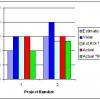Process
Articles
 |
The Neglected Practice of Iteration In this week's column, Jeff Patton sends a reminder that software developers who neglect the practices of "iteration" and "incremental" will get caught either delivering poor quality software or delaying schedules in order to make time to iterate. We kick ourselves, or others, for not "getting [software] right up front" when we all know that the hardest part of software development is figuring out what to build. But there's hope, and it comes in the form of prototypes and frequent iterations. |
|
|
Agile Strategies for Geographically Distributed Quality Management Geographically Distributed Development (GDD) is a common strategy in the software world today. Organizations are gaining experience in developing software globally and are discovering that the competitive demand for best-in-class, high quality applications requires greater agility in quality management. Unfortunately, IT budgets are not keeping up with the staff required for quality management and the response is to accelerate quality management by leveraging global teams. This article compares and contrasts agile GDD testing strategies for affecting quality management. |
||
|
Hidden Messages A defect management system contains data such as how many defects have been raised, the priority and severity of individual defects, and even who is raising them. This information is regularly used by program and test management to guide decision making. In this article, Dan Minkin proves that an experienced test manager can gather useful information by looking at more than just the defect management system's data. |
Dan Minkin
November 27, 2007 |
|
|
Managing Offshore XP Teams: Organizational Models and Tools The essence of Extreme Programming (XP) is making the customer a part of the team who works very closely with the developers, ideally communicating on a daily basis. However, what about a situation where your development team is offshore? Is it possible to have the best of both worlds, realizing the gains of offshoring without losing the benefits of XP? How do you keep the momentum and the communication flow going, at the same time ensuring seamless integration of the deliverables into the customer's production environment at the XP pace? |
||
 |
Test Software before You Code Testing doesn't have to begin after the code has been written. In this column, Jeff Patton resurrects the oldest and most overlooked development technique, which can be used to test a product before any piece of it materializes. |
|
|
Tool Integration In Distributed Agile Development This article provides an overview of various tools, integration strategies and their benefits in agile environments. These tools would come in handy in implementing key agile practices like daily builds, refactoring, continuous integration and test driven development. |
||
|
Agile SCM: It’s All Related In this article, the authors the use of basic patterns that can help build a software configuration management process that works well with your agile development environment. They discuss how codeline policy, private work spaces, smoke tests, private system builds, integration building, unit testing, and regression testing all work together to enable you to maintain an active development line. |
||
|
Feature-Driven Development: An Agile Alternative to Extreme Programming Feature-driven development (FDD) has the more traditional progression of a systems-engineering life cycle mode as compared to agile methods. It uses distinct phases in its iterations while still being highly iterative and collaborative. FDD does conduct up-front planning, design and documentation and relies very heavily upon domain modeling. |
||
 |
How to Merge XML Data with a Database In his article "Data Crunching Tips and Techniques," Greg Wilson taught us how to translate legacy data into XML. In the second half, he explains how to merge new data into an existing database. Developers will always face these types of data crunching problems, and knowing the standard data crunching tools can save you a lot of time. Greg also shares the basic knowledge about relational databases that every developer should possess. |
Greg Wilson
April 6, 2006 |
 |
Free Time is Not Free Unpaid overtime has negative personal and business consequences. Although regarded as free time by many organizations, there is a true business cost to not estimating or counting overtime hours, whether paid or not. Ed Weller presents the argument that those who do not count free time in their planning and tracking will make poor decisions and often invest in the wrong projects. |








